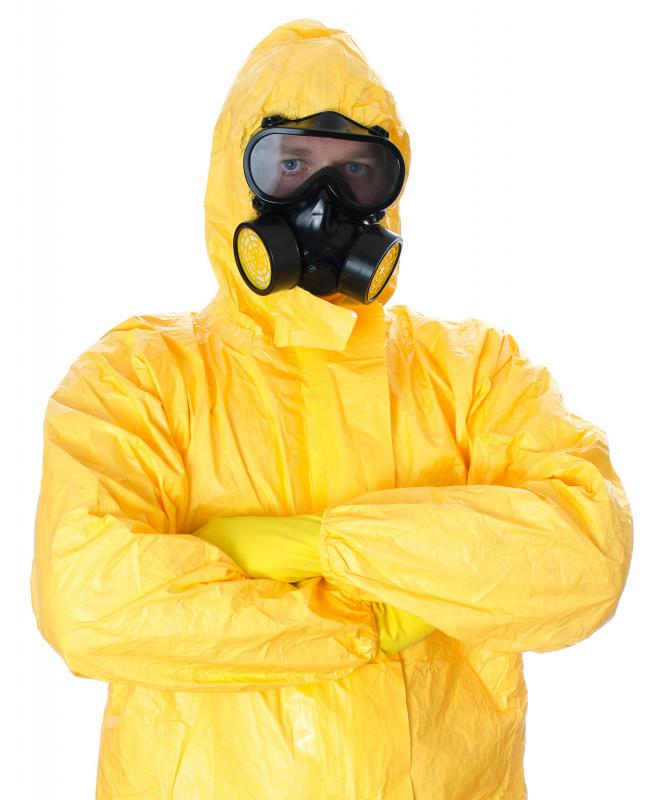At WiseGEEK, we're committed to delivering accurate, trustworthy information. Our expert-authored content is rigorously fact-checked and sourced from credible authorities. Discover how we uphold the highest standards in providing you with reliable knowledge.
What is the Occupational Health and Safety Act?
The Occupational Health and Safety Act is a United States federal law aimed at regulating safety in the workplace. The act was passed in 1970 to make sure that employers provide a safe and nontoxic environment for their employees in order to prevent work-related illnesses, injuries, and fatalities. The United States Department of Labor established the Occupational Safety and Health Administration (OSHA) in 1971 to set safety standards and oversee state compliance with the act. Each state has the right to create its own workplace health and safety regulations, as long as they are approved by the OSHA.
The standards set by the Occupational Health and Safety Act can depend on the type of industry. There are four major industry categories under the act: construction, maritime, agriculture, and general industry. Since each of these industries have different job requirements and procedures, there may be standards that only apply to certain industries. For instance, industries that are considered to be low-hazard environments by the OSHA, such as real estate, service, finance, or retail, have more lax safety rules.

All industry employers must inform employees of any hazardous materials they may come into contact with as part of their work duties. They also have to give safety training on how to properly use any equipment, as well as supply employees with protective gear. If any accidents occur in the work environment that cause employee hospitalization or death, the employer is required by law to notify the OSHA within eight hours.

Under the Occupational Health and Safety Act, workers have the right to report any dangerous or unsanitary conditions in their workplaces to the OSHA. When an employee files an official complaint with the OSHA, an inspector will conduct an investigation. If an employer is found to not be following the provisions of the act, he or she can be subjected to financial penalties. The act prohibits employers from discriminating against workers who report conditions to the OSHA. The agency will assist an employee with legal action if an employer is discriminating against an employee for contacting the OSHA.

The Occupational Health and Safety Act applies to all 50 states, Puerto Rico, the District of Columbia, and all United States territories. Some industries, such as nuclear plants, transportation, and mining, have specific safety regulations set by other federal laws rather than the Occupational Health and Safety Act. Farms that are run only by family members are not regulated by the act, and neither are those who are self-employed.
AS FEATURED ON:
AS FEATURED ON:
















Discussion Comments
I would like to clarify that the Occupational Health and Safety Act is not damaging to employers. It does require that employers take certain precautions for their employees' safety and of course, some money has to be spent to get everything up to a certain standard in the company.
In the long term though, employers who follow provisions of the act are going to gain because they won't have to pay compensation to employees who are hurt on the job, not to mention medical expenses, loss of profit and god forbid, a legal case against them.
So the Occupational Health and Safety Act benefits everybody, both employees and employers in my view.
Since the Occupational Safety and Health Act was established in 1970, have there been any amendments to it?
I would imagine that there were because I think a lot has changed in industry and employment in the US since then. What were some of the amendments to the Act and why?
I worked at a restaurant as a cook during my senior year in High School. I got burnt with hot oil while cooking and did not receive any treatment while on the job, nor was I sent to the hospital.
Now, I know better and would have rushed to the hospital and made the restaurant pay for my treatment. But I didn't know how things worked then and did not have any health insurance.
My arm was in a very bad condition for weeks and there is a huge scar now that will stay with me for life.
Was the behavior of my employer against the Occupational Health and Safety Act? Since I wasn't given any protective clothing or equipment by my employer which caused me to get hurt, did I have the right to report them to the OSHA?
Post your comments